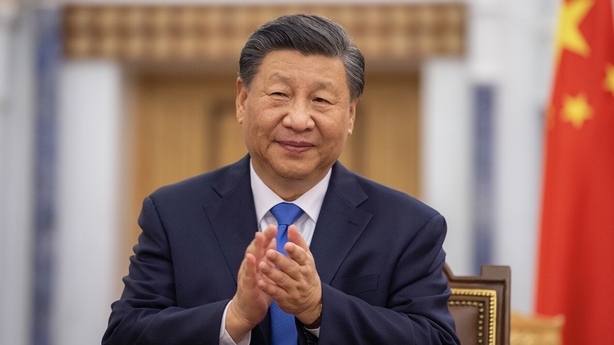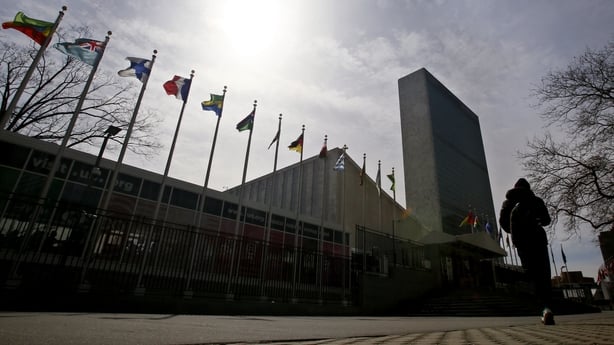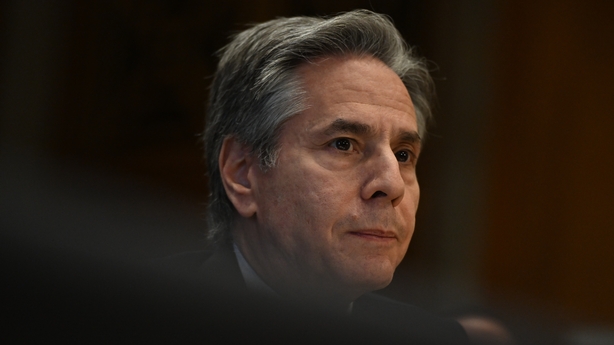When senior officials from Iran and Saudi Arabia leant over to shake hands, the most shocking thing was less that the bitter rivals had agreed a peace deal, but that the man between them was not American.
He was Chinese.
It was seen as a deeply significant moment in the rise of China's diplomacy to challenge to American influence in the Middle East – and beyond.
"The US is no longer the only game in town," Trita Parsi, the executive vice president of the Quincy Institute for Responsible Statecraft, told RTÉ News.
Washington appeared to have been caught off guard by China's diplomatic win, he said.
In many senses, it is good for the US if the Middle East is more stable.
"But it won't be good for Washington if it is perceived in the region as an entrenched warmaker, while China is a pragmatic peacemaker," Mr Parsi said.
It is as pragmatic peacemaker that China is keen to position itself on the global stage.
At this week’s summit between China’s leader Xi Jinping and Russia’s Vladimir Putin, the "dear friends" once again touted China’s "12-point peace plan" – which does not include a demand for withdrawal of Russian troops – as the path to ending the war.
But Beijing’s cosying with the Kremlin is as much about the Chinese Communist Party’s own self-interest as it is about peace or indeed love for Putin, according to analysts.
"Xi is looking out for China's interests above all else," Katie Stallard, an expert on Russia and China, told RTÉ News.
"As a fellow permanent member of the UN Security Council, with an accompanying veto, which retains significant trading relationships through sales of energy and weapons systems, Russia is still useful for China," said Ms Stallard, author of Dancing on Bones: History and Power in China, Russia, and North Korea.
The China-Russia relationship creates a powerful authoritarian bloc inside the United Nations, stymying Security Council action and undermining the democratic values on which the agency was built.

But the rapid unification of the traditional US-led "western alliance" in response to Russia’s invasion of Ukraine has concentrated minds in Beijing.
"Beijing fears that, if Putin's regime falls, it might be replaced by a new, pro-Western government," she said, which could isolate China.
By building alliances with other non-democratic states, China hopes to create a buffer.
In a recent speech, China’s leader, Xi Jinping, laid out in unusually stark terms what he saw as the greatest threat to China’s rise: the United States of America.
"Western countries led by the United States have implemented all-around containment, encirclement and suppression of China, which has brought unprecedented severe challenges to our country’s development," Xi said, according to Chinese state media.
Accusing the United States of being the greatest threat to international peace and security has become a popular theme for Beijing’s propagandists.
Chinese officials didn’t miss the opportunity to point out on social media platforms (which are banned inside China) that the Riyadh–Tehran deal came around the 20th anniversary of the US-led illegal invasion of Iraq.
Hua Chunying, a spokesperson for China’s Ministry of Foreign Affairs, tweeted that the US was "obsessed with military build-up, war and destruction", while China, she wrote, was "committed to dialogue peace and construction" – a sentiment greeted with cynicism by observers of China’s military aggression in Asia.
Beijing has repeatedly threatened to take the self-ruling democracy of Taiwan "by force if necessary" and frequently flies warplanes past the island to underscore its point.
Meanwhile, People’s Liberation Army troops have clashed with Indian soldiers in a long-running territorial dispute along their Himalayan border and China continues to build military outposts in disputed areas of the South China Sea.
Beijing insists its military expansion – spending rose to its highest level this year of $224 billion – is purely defensive.
But announcing the expenditure hike earlier this month, the-then Premier Li Keqiang said China’s armed forces, should "boost combat preparedness and enhance military capabilities".

The US must get used to China challenging its military and diplomatic pre-eminence and find a way of co-existing, Mr Parsi said.
"The most dangerous course of action the West can take is to resist these gravitational forces of geopolitics and try to reverse this trend," he said.
"Unipolarity is already over."
But the emergence of an authoritarian superpower that won’t lecture non-democratic nations on human rights, as the US and European countries do, is a gift to dictators around the world.
"When the Biden administration held its 'Summit for Democracy' in December 2021, Beijing issued its own working paper on 'Democracy that Works' and has pushed its own self-serving definitions of democracy and human rights that have little appeal in the west but have found a receptive audience among other authoritarian leaders," Ms Stallard told RTÉ News.
"This provides useful cover for fellow autocrats to dismiss 'western' notions of human rights and individual freedoms to serve their own interests," she said.
But while it’s useful for some countries – especially those with the natural resources to oil the global economy – to play two superpowers off against the other, the economic, diplomatic and military reach of the United States built up since the end of World War makes it unlikely to be knocked off its perch any time soon.
Saudi Arabia’s ties with the US and its allies, for example, run deep. The US has a long-standing security relationship involving the military protection in exchange for oil.
The Saudi kingdom is the largest buyer of American arms in sales worth more than $100 billion.
Military strikes using weapons supplied by the United States (and the UK) have been directly linked to civilian deaths in Yemen, according to investigations by human rights groups. Chinese and Russian weapons, meanwhile, have been channeled to Iran-backed Houthi rebels on the other warring side.

The idea that the Chinese-brokered thaw in relations between Iran and Saudi Arabia could see an end to the eight-year war in Yemen was greeted with cautious optimism in Washington, but the UN Special Envoy on Yemen, Hans Grundberg, called on all parties to "seize the opportunity" for peace.
Meanwhile, hot on the heels of Chinese negotiators, US diplomats travelled to the Middle East this week with the US Special Envoy to Yemen, Tim Lenderking, in Saudi Arabia and Oman – to try and extend a UN-mediated truce.
While the rise of Chinese diplomacy offers an "alternative to the US-led global order", defined by "liberal ideas and universal human rights" according to Ms Stallard, she doubted whether Beijing would be willing to dive into complex and lengthy peace negotiations with no immediate benefit to China’s national interests.
It’s a view echoed by Alex Vatanka, Director of the Iran Program at the Middle East Institute in Washington DC.
"Having a grand entrance onto the diplomatic stage is one thing, but there’s a long road ahead. Saudi Arabia and Iran have had a very complicated relationship going back since even before 1979," he told RTÉ News.
He questioned whether China would keep the Iranian and Saudi feet to the fire to achieve tough outcomes, like ending the Yemen war.
But China’s emergence as a diplomatic force signals the opening of new chapter, Mr Vatanka said.
And the US will need to walk "a very fine line" between standing up for its democratic values, while being careful not to push "practical partners" right into the arms of China and Russia.







